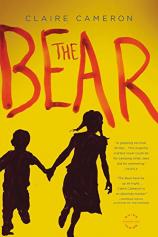The Bear
Review
The Bear
Narrating a story or novel from the point of view of a very young child is a risky proposition. When done poorly, the results can be simplistic or overly precious; when done well, the voices of these narrators can remain in our minds and hearts for a very long time (remember ROOM, anybody?). Novelist Claire Cameron, whose first novel was THE LINE PAINTER, boldly attempts this task in her latest, THE BEAR, and the results are outstanding --- heartbreaking, brave, and even funny.
In a preface, Cameron reveals the genesis of her story. As a young woman, she led canoe trips in Ontario's Algonquin Provincial Park where, the previous year, a young couple had been killed in a seemingly unprovoked bear mauling. The incident haunted Cameron's memories of that place, and in THE BEAR, she reimagines the story as fiction, adding the couple's two children, who become her protagonists.
"Readers’ hearts will ache as they realize how little Anna understands and how much sadness she has yet to absorb. Equally affecting, however, is the realization of how much Anna does know --- about courage, survival and, most of all, love."
Anna is a typical five-year-old. She is proud of her almost-first-grader's maturity, especially when she compares herself (as she often does) to her younger brother Alex, whom she has nicknamed Sticky, or Stick. Stick is still a toddler, and he alternately annoys and infuriates Anna --- dirtying his diaper, making other kinds of messes, or trying to take Anna's beloved teddy bear, Gwen.
We learn in the course of the story (through Anna's oblique narration) that the children's parents have been having problems lately; their current camping trip to Algonquin Provincial Park appears to be an attempt for the couple to reconcile. But what should be an idyllic scene of a small family camping on a remote island soon turns nightmarish. Anna is awakened from within the tent by her mother's screams. In a panic, the children's father stashes the two kids in the family's large, bear-proof cooler. When morning comes and Anna figures out how to open the cooler (mostly to escape from Stick's stink), she discovers their campsite in disarray. Their father has seemingly disappeared, and their mother can barely speak. "Take your brother for a canoe ride," she tells Anna. "When it's time…Daddy and I will be there."
Anna doesn't know enough to be scared of the bear, which she calls a "black dog," and she wants to be a good girl for her mother, so she does what her mother asks her to, paddling with her hands (because the family's oars were broken in the fight with the bear) to the nearby mainland. There she helps Stick find food and water, trying her best to protect him, even though she's not sure how to help either of them survive things like sunburn, dehydration, poison ivy, or a return visit from the "black dog."
Anna's narration is told in a stream-of-consciousness style, which can be even more disorienting than usual, given that it's a five-year-old's consciousness being represented in the text. Anna's dreams and fantasies blend into her impressions of reality in a way that seems completely genuine and age-appropriate. Of course, the distance between Anna's circumstances and her understanding of them offers rich potential for narrative irony, which in Cameron's story is most frequently utilized to evoke pathos, but is also employed to provide humor, as when Anna is convinced that a female moose is actually a horse.
Readers’ hearts will ache as they realize how little Anna understands and how much sadness she has yet to absorb. Equally affecting, however, is the realization of how much Anna does know --- about courage, survival and, most of all, love.
Reviewed by Norah Piehl on February 28, 2014





